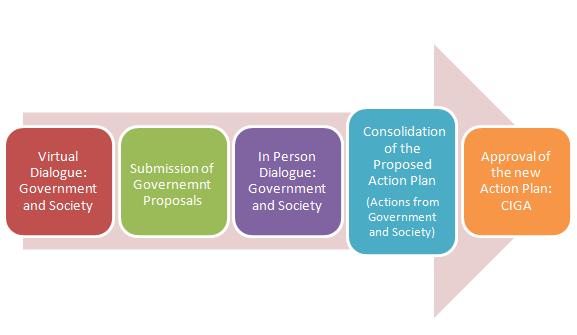Brazil – consulting civil society on a new Country Action Plan
Before Brazil’s first OGP action plan even had its one year anniversary, preparations for a new action plan and consultation process were already underway. In fact, conversations around a new action plan and a more robust consultation process started back in April 2012 at the 1st Annual Conference of OGP, hosted by Brazil. The methodology for the new consultation process was developed jointly by the governments and representatives from 10 civil society organizations in a working group established by Brazil’s Interministerial Committee for Open Government – CIGA, created by President Dilma in September 2011 to, among other functions, act as the country’s OGP consultation forum. The working group is coordinated by the Office of the Comptroller General – CGU. The new consultation process comprised two phases: a virtual dialogue and an face-to-face meeting. The online dialogue process included three sets of action:
- the publication and public consultation on the assessment of the implementation of Brazil’s first action planAction plans are at the core of a government’s participation in OGP. They are the product of a co-creation process in which government and civil society jointly develop commitments to open governmen... – citizens and organizations commented on information provided about the implementation of commitments and provided feedback for future consultations.
- the submission by civil society and citizens of proposals for new commitments – citizens could make proposals addressing all five grand challenge areas of OGP. Later participants were asked to vote and choose the 15 proposals the government should prioritize.
- the submission of proposals by governments agencies – federal agencies presented a total of 59 proposals and asked civil society for their comments and inputs.
The online dialogue process lasted for almost two months last year, from October 29 to December 5. It was conducted through the e-democracia platform, a website created by the Chamber of Deputies (National Congress). Now, we prepare ourselves for the face-to-face dialogue, set to occur from March 13 to 15 in Brasilia. 66 representatives from 60 civil society organizations, 09 selected citizens who had an outstanding participation in the virtual dialogue and government officials from over 20 different agencies will together draft in the 3 days of the event up to 15 other proposals for possible commitments. All proposals prioritized by citizens in the virtual and face-to-face dialogues will be evaluated by federal agencies, which will decide whether to accept them in full or partially, or reject them. The agencies will have to consider multiple criteria in their analysis, like feasibility, legal regulationGovernment reformers are developing regulations that enshrine values of transparency, participation, and accountability in government practices. Technical specifications: Act of creating or reforming ... and availability of budget and human resources. A report on the reasons for incorporation or rejection of the (up to) 30 proposed commitments submitted by citizens and civil society will be available on e-democracia in April 2013. Finally, civil society proposals and government proposals will be approved by the CIGA and consolidated in the new country action plan for 2013-2014.
The new consultation process in Brazil is already presenting very interesting and exciting results, although it is still very much a work in progress. We hope to learn valuable lessons for future consultations, in order to continue stretching beyond current practice not only in our commitments, but also in how we develop these commitments. One thing we are sure of though is that we can see every day how the enthusiasm is growing and how we are maintaining the momentum from the April 2012 Conference high. Anyone interested in more information about the face-to-face dialogue this week can follow the event and debates via CGU’s website and twitter account – @cguonline. 
